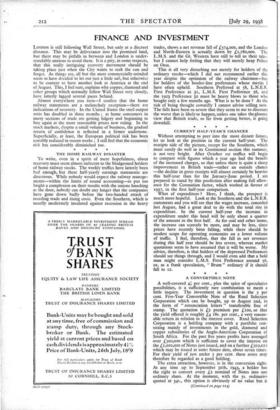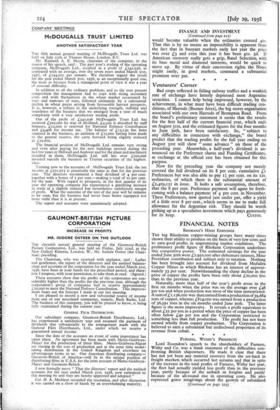FINANCE AND INVESTMENT
LONDON is still following Wall Street, but only at a discreet distance. This may be deliverance into the promised land, but there may be pitfalls in between and London is under- standably anxious to avoid them. It is a pity, in some respects,. that this really intriguing recovery movement should be taking place just when the City wants to seek the sun and forget. As things are, all but the most commercially-minded: seem to have decided to let out just a little sail, but otherwise to be content to have another look at America at the end of August. This, I feel sure, explains why copper, diamond and other groups which normally follow Wall Street very closely, have latterly lagged several paces behind.
Almost everywhere you turn—I confess that the home railway statements are a melancholy exception—there are indications of recovery. In the United States the steel output ratio has doubled in three months ; at home consumers in many sections of trade are getting fidgety and beginning to buy again at the more reasonable prices now ruling. In the stock markets, despite a small volume of business, the gradual return of confidence is reflected in a firmer undertone. Superficially, at least, the European political risk has been sensibly reduced in recent weeks ; I still feel that the economic, risk has considerably diminished too. * * * *
THE HOME RAILWAY DISASTER
To write, even in a spirit of mere hopefulness, about recovery must seem almost indecent to the bludgeoned of home railway stocks. The weekly traffics have latterly been bad enough, but these half-yearly earnings statements are disastrous. While nobody would expect the railway manage- ments—within the limits of sound accounting—to put too bright a complexion on their results with the unions knocking at the door, nobody can doubt any longer that the companies have gone down badly before the two-handed attack of receding trade and rising costs. Even the Southern, which is usually moderately insulated against recession in the heavy trades, shows a net revenue fall of £574,000, and the London and North-Eastern is actually down by £1,780,000. The L.M.S. and the Gt. Western have still to tell us their tales, but I cannot help feeling that they will merely heap Pelion on Ossa.
This is all very disturbing not merely for holders of the ordinary stocks—which I did not recommend earlier this year despite the optimism of the railway chairmen—but for holders of the border-line preferences whose merits I have often upheld. Southern Preferred at 58, L.N.E.R. First Preference at 31, L.M.S, First Preference -56, and the 1923 Preference 32 must be heavy blows to those who bought only a few months ago. What is to be done ? At the risk of being thought cowardly I cannot advise selling now. The falls have been so severe that they seem to me to discount the worst that is likely to happen, unless one takes the gloomy view that British trade, so far from getting better, is going downhill.
* * * * CURRENT HALF-YEAR'S CHANCES
Without attempting to peer into the more distant future, let us look at the position in the current half-year. The receipts side of the picture, except for the Southern, which must surely do well in its Continental section this summer, is not very bright. After October 1st traffics will begin to compare with figures which a year ago had the benefit of the increased charges, so that unless there is quite a sharp improvement in British trade—rather an outside chance —the decline in gross receipts will almost certainly be heavier this half-year than for the January-June period. I am prepared to stand by this prediction after making full allow- ance for the Coronation factor, which worked in favour of 1937, in the first half-year comparison. What of expenditure ? Here, I think, the prOspect is much more hopeful. Look at the Southern and the L.N.E.R. statements and you will see that the wages increase, conceded last August, had a great deal to do with the total rise in expenditure. In the current half-year the increase in expenditure under this bead will be only about a quarter of the amount in the first half. As for coal and other items, the increase can scarcely be more, and may be less, since prices have recently been falling, while there should be modest scope for operating economies on a lower volume of traffic. I feel, therefore, that the fall in net revenues during this half year should be less severe, whereas Market quotations seem to have assumed that it will be worse. My advice, therefore, is that holders of the depressed Preferences should see things through, and I would even add that a bold man might consider L.M.S. First Preference around 56, or, as a frank speculation, " Brum " ordinary if it should to 12.
* * * *
A CONVERTIBLE NOTE
A well-covered 4g per cent., plus the spice of speculative possibilities, is a sufficiently rare combination to merit a little inquiry. The investment in question is the 5 per cent. Five-Year Convertible Note of the Rand Selection Corporation which can be bought, up to August 2nd, in the form of " renunciation letters " transferable free of stamp. The quotation is £2 premium per £100, so that the yield offered is roughly £4 18s. per cent., a very reason- able return in relation to the interest cover. Rand Selection Corporation is a holding company with a portfolio con- sisting mainly of investments in the gold, diamond and copper subsidiaries of the Anglo-American Corporation of South Africa. For the past five years profits have averaged over £5oo,000 which is sufficient to cover the interest on the £1,000,000 of Notes just issued, and on a further £.5oo,0o) which may be issued at some future date, about seven times. For their yield of just ,under 5 per cent. these notes may therefore be regarded as a good holding.
The extra attraction, however, is in the conversion right. At any time up to September 30th, 1943, a holder has the right to convert every £2 nominal of Notes into one ordinary share. At the moment, with the 5s. ordinaries quoted at 34s., this option is obviously of no value but it
(Continued on page 214)
FINANCE AND INVESTMENT (Continued from page 212) would become valuable when the ordinaries crossed 4os. That this is by no means an impossibility is apparent from the fact that in buoyant markets early last year the price was over £3 and even this year it has been 41s. 3d. If American recovery really gets a grip, Rand Selection, with its base metal and diamond interests, would be quick to move up. By virtue of their conversion rights the Notes might easily, in good markets, command a substantial premium over par. * * * *
Venturers' Corner
Bad crops reflected in falling railway traffics and a weakish rate of exchange have latterly depressed most Argentine securities. I cannot help being impressed, however, by the achievement, in what must have been difficult trading con- ditions, of Harrods (Buenos Aires), the big stores organisation associated with our own Harrods of Brompton Road. From the board's preliminary statement it seems that the results for the first half of the current financial year, which ends on August 31st, and the estimated figures for the four months to June 30th, have been satisfactory. So, " subject to any difficulties in connexion with exchange," the board predict that the trading profits for the full year ending on August 31st will show " some advance " on those of the preceding year. Meanwhile, a half-year's dividend is an- nounced on the Preference shares and Funding Certificates, as exchange at the official rate has been obtained for this purpose.
Now for the preceding year the company not merely covered the full dividend on its 8 per cent. cumulative Er Preferences but was also able to pay I I per cent. on its i2S. ordinaries, of which there is the substantial amount of £2,409,151 in issue. It looks a safe assumption, therefore, that the 8 per cent. Preference payment will again be forth- coming with a balance payment of 4 per cent. in November. These Preferences, now quoted just under par, offer a yield of a little over 8 per cent., which seems to me to make full allowance for the Argentine risk. They should be worth picking up as a speculative investment which pays generously



































 Previous page
Previous page